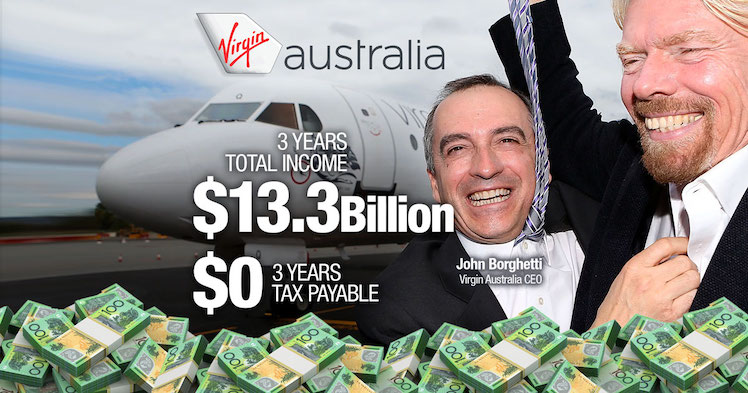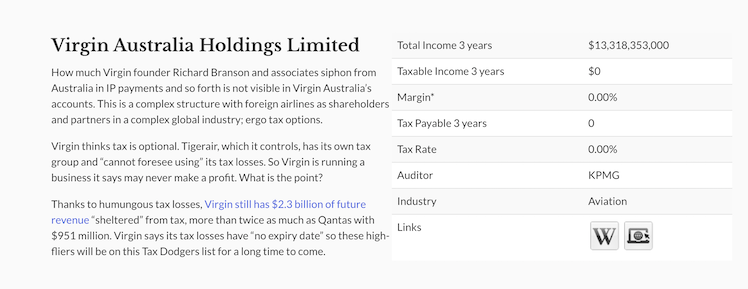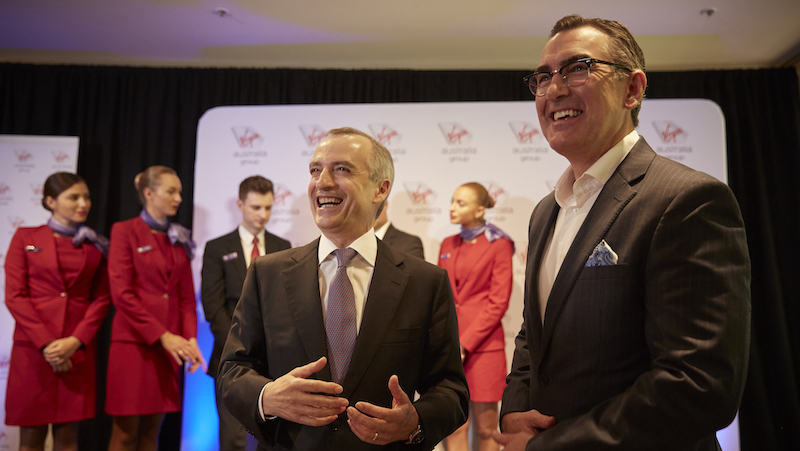Virgin Australia boss Paul Scurrah and his predecessor John Borghetti have, over the past two years alone, personally handed Scott Morrison, Josh Frydenberg – and at least 52 other current Coalition MPs – “gifts” worth hundreds of thousands of dollars. Already, the Prime Minister and Treasurer have given Virgin taxpayer support – part of the $715 million fees and charges waiver – but Scurrah is chasing more. Does the Government bail-out a company which is 91% foreign owned and which pays no tax? Anthony Klan reports on a classic case of political influence.
It’s a club so secretive its entrances are hidden. So selective it’s invitation only, and so exclusive that invitations are only granted by the CEO himself.
Virgin Australia’s “secret and invitation-only” club is so exclusive it is referred to as simply “The Club” (not that you’ll find any mention of it anywhere on Virgin’s website) and the benefits read like something from the gilded age of the Great Gatsby.
“Reserved for the airline’s most highly-valued passengers including A-list celebrities, CEOs and those with a good deal of input over a company’s travel policies, membership in The Club can only be granted by Virgin Australia CEO John Borghetti and lasts for two years at time,” Australia Business Traveller writes in a 2018 article.
The publication tells us the “most coveted benefit” of being hand-picked by Virgin Australia’s CEO to join this “secret VIP tier” is that it unlocks access to Virgin’s hidden, exclusive lounges in the airports of Sydney, Melbourne, Brisbane, Perth and (you guessed it) Canberra.
(Not that it’s likely you will have ever seen them. Their entrances, so as to be hidden from the pesky public, carry simply the words “private”, or are completely unmarked).
If Virgin Australia CEO Paul Scurrah, who has been in the job 12 months, personally picks you out and sends you an invitation to his secret club, you’re in for one hell of a treat.
Unlike business class lounges, where executives mingle before flights, if you’re a member of Virgin’s The Club, you can turn up whenever you like — it matters not whether you are actually flying.
And you can bring along two mates — three if you do happen to be flying that day.
Only the best foods that money can buy are served – meals cooked up specially by renowned chefs – and while you’re eating to your heart’s content, you can quaff away on some of the world’s finest wines.
Aged whisky? Port? A few boutique brews? You got it.
Don’t want to get a cab home from the airport? Don’t worry! Now you’re one of us, a VIP limousine will pick you up.
And none of it will cost you a cent.
Why would Virgin Australia be giving away such lavish gifts for no return? Well Scurrah, and his predecessor at Virgin, John Borghetti, have been doing just that. The MPs and ministers upon whose Virgin’s hospitality is bestowed are those who also have the power to spend taxpayer money bailing out corporations.
Will Australian taxpayers be subsidising the governments of China, Singapore and Abu Dhabi whose airlines control the majority of Virgin shares? And what happens if the Government sticks to its Liberal Party rhetoric of free markets and let’s Virgin collapse?
Back at the club house
Last week, Paul Scurrah was walking the halls of Parliament House looking for someone to hand his airline hundreds of millions of dollars of taxpayer funds.
Virgin’s chief executive had decided the airline needed more money and that Australia’s taxpayers should foot the bill. Heaven forbid the Chinese Airlines who control the company tip .
No matter that Virgin Australia just three weeks ago, on February 26, reported having a massive, $1.11 billion, stash of cash just sitting in its bank accounts, or the fact that it had delivered an “underlying profit before tax of $14.5 million” and delivered a “record first half revenue of $3,116.3 million”.
Now, in strolling the halls of parliament, Scurrah would have been hard-pressed finding a Coalition MP who wasn’t a member of his secret club, and therefore didn’t present a direct conflict of interest when asking for millions from taxpayers.
Scurrah is not burdened by any such concerns, rather how to keep his company as a going concern. It is a high-stakes game. This morning, Virgin announced it was standing down 8,000 staff and grounding 90 per cent of its domestic capacity. Its subsidiary TigerAir, which like Virgin, pays no income tax, is also grounded.
So it is, and despite a war of words with rival Qantas, that Paul Scurrah is on a corporate welfare campaign. “Those he could not meet in person – Deputy Prime Minister Michael McCormack and Tourism Minister Simon Birmingham – he spoke to by phone,” The Sydney Morning Herald tells us.
And it’s no wonder he had their numbers to hand.
Tourism minister Birmingham is one of those lucky few to have been invited to join Scurrah’s secret club — an offer, which parliamentary disclosure registers show, Birmingham was happy to accept.
And guess what? Deputy Prime Minister, the National Party’s Michael McCormack, of Wagga Wagga NSW, has also been repeatedly offered, and has repeatedly accepted, memberships to Scurrah’s secret club.
Not only McCormack, his wife too — Catherine Shaw.
Never mind that Shaw could already visit the lounge as one of McCormack’s two or three guests anytime he went, it seems Virgin’s top dog thinks Shaw too deserves this most luxurious of gifts. In fact, the disclosure registers show at least 20 partners of Coalition MP’s have also been given memberships to The Club.
The law
A key issue for Paul Scurrah – and the entire Virgin Australia board – out of all this is the following:
Does Virgin Australia expect favourable treatment in return for all this largess flowing to our elected members, their partners, husbands and wives?
If so, is this providing of “gifts” in return for government favours legal?
If not, how do they explain to Virgin’s shareholders the fact they are just giving away hundreds of thousands of dollars of company funded perks for nothing?
Under the Corporations Act, companies must act in the best interests of shareholders.
If Virgin Australia is not seeking or receiving anything in return for all these expensive memberships it is just handing away for free, how is it at the same time acting in the best interests of shareholders?
This might be a question for an independent, or one of the few who haven’t taken up Virgin’s largesse.
Money for nothin’…
Despite a multitude of headwinds, which many would argue include fairness for taxpayers, the Government doing the right thing and simple common sense, Scurrah, and fellow millionaire Qantas CEO Alan Joyce, were successful. (It’s worth noting Qantas also “gifts” membership to its own exclusive club, The Chairman’s Lounge. The gifts handed to our federal politicians by Virgin Australia and Qantas are far bigger and more valuable than the gifts given by any other companies, people or entities, Michael West Media’s detailed analysis of disclosure records shows).
And it was almost immediate — while the pair were on their Canberra door knocking mission “early last week”, as The Sydney Morning Herald reports, the Morrison government on Tuesday last week announced a $715 million taxpayer bailout.
Fees and charges would be waived over many months and domestic airlines (Qantas and Virgin being the main two) would receive $159 million straight away for reimbursement of fees they’d paid since 1 February.
Given both airlines have grounded most of their fleet, and that the ban is unlikely to lift any time soon, some of the future benefit may not be realised because fewer fees will be incurred by the airlines. But the $159 million is in train and there are suggestions Canberra is considering even more taxpayer bailouts for the airlines.
(One option the government could have considered was reducing/cutting the tax Virgin pays. Except it doesn’t pay any income tax in Australia and hasn’t for years.)


Qantas has about 65% of the domestic market, Virgin and its subsidiary Tiger have about 30%, with Rex Regional Express (or Rex), and a handful of other small airlines making up the remaining 5%.
That means Virgin Australia’s share of this taxpayer-funded loot, if the full benefit of the existing bailout is realised, is about $215 million (about $48 million if just looking at the fees that will be refunded since 1 February).
McCormack, who along with being a member of Virgin’s exclusive Club, also holds the second highest position in our land, is behind this idea all the way.
The COVID-19 related bailouts were “unprecedented” and in response to a “likely sustained period” of demand for plane flights.
“I’ve been speaking with Australian airline executives every day and will continue to work with them to make sure they receive the support they need,” McCormack said.
“Our airlines run on tight budgets at the best of times and these past few weeks have been particularly tough.”
But there’s one issue with that last sentence and it’s kind of important.
You see, despite its name – and how many of us perceive the airline, based largely on all its advertising – Virgin Australia isn’t “ours”, as in “Australian”, at all.
In fact it’s 91% owned by foreign entities — and that’s at the very least.
Virgin Australia (of China)
The following entities own around 20% each: Singapore Airlines (majority owned by the Singapore Government); Etihad Airways (21%, owned by the government of Abu Dhabi, the wealthiest member of the UAE); Chinese conglomerate Nanshan Group; and China’s HNA Group. Richard Branson’s Virgin Group own around a mere 10%.
That leaves about 9% of Virgin Australia’s shares, which are the ones traded on the ASX.
Studies show just under half of the money invested in ASX 200 companies is foreign capital (around 43 per cent).
So the amount of Virgin Australia that is actually owned by Australians may be around 5%.
It’s a parcel so small that even if all those thousands of individual shareholdings were combined with one person/entity it’s possible they wouldn’t even need to file a “relevant interest” notice with the ASX to disclose their ownership (it kicks in at 5%).
So hang on … did the Federal Government just give MILLIONS OF DOLLARS away to a company owned by China and the extremely wealthy governments of Singapore and Abu Dhabi?
Yep.
Of particular note is the Chinese ownership. At 40%, the Chinese interests together, Nanshan and HNA, own twice as much of Virgin Australia than the next biggest shareholder.
It is China’s Virgin Australia.
HNA, with 20%, has long been on the radars of security experts given it has very close ties to the Chinese Communist Party.
It is blacklisted by the Bank of America, and numerous other groups, who refuse to do business with it.
Now the connections are explicit: China took it over in February, weeks before the Coalition’s hand-outs to Virgin Australia.
Based on its ownership structure, and if the $215 million benefit flows in full, here’s how it will be enjoyed: $85m by Chinese entities ($43m by the Chinese Government-controlled HNA Group); $43m by Singapore Airlines; $43m by Etihad; and about $22m by interests connected to Branson. (The Australian investors in Virgin Australia, who hold shares via the ASX, somewhere around $11m — or 1/20th).
The UK government, facing a similar scenario, is said to be undertaking plans to take an equity stake in some airlines.
Doing this is clearly preferable to just handing money over to private companies for nothing in return.
Australia does need a major carrier in Qantas and if it were entirely necessary – not that it is right now – many believe the Government would do better to buy a stake in Qantas than just throwing it money.
But buying into a long financially questionable airline is an entirely different issue, and one that many experts say should be avoided at all costs.
The Parish Boy’s Progress
So why don’t the governments of China, Singapore and Abu Dhabi support Virgin Australia given they own it and it is they who will benefit?
Has Paul Scurrah asked them?
On Wednesday last week, just a day after the $715 million bailout was announced, Scurrah was in the Australian Financial Review pushing for more — a modern day multi-millionaire Oliver Twist.
The paper writes:
“He also ruled out asking the airline’s five significant foreign shareholders – Singapore Airlines, Etihad Group, China’s Nanshan and state-operated HNA Group, plus Virgin Group – for a cash injection.”
‘We are not talking about any need for capital injections into our business. We’ve told the market we have a solid cash position. We have told the market we have a plan,” it quotes Scurrah as saying.
But a bailout has exactly the same effect as a cash injection — it’s about more assets, less expenses. It’s just that the Australian taxpayer is paying for it and not the foreign governments who actually own Virgin Australia.
Bizarrely, while saying the hundreds of millions they pledged the day before probably wasn’t enough, the Virgin CEO was also boasting the airline’s “strong cash position”, as reported:
“Mr Scurrah reiterated his belief Virgin Australia would be ‘in a strong position at the other side of this crisis’.
‘We have a solid cash position. We have no debt maturity until the end of next year. We’re not taking on any new major capital expenditure items,’ Mr Scurrah said.”
We put two sets of written questions to Scurrah and Virgin Australia last week. We haven’t receive a response whatsoever.
Jobs, jobs, jobs
As is usually the case with corporates seeking government handouts, Virgin has argued that the Australian taxpayer should give it money because if it collapses, people will lose their jobs.
This is true.
But numerous experts have said Virgin’s employees would be be far better served if the money went instead to unemployment benefits, with some expressing confusion as to why the government would be bailing out a foreign-owned airline.
And while Virgin may be claiming to be caring about jobs now, it was a different story just three weeks ago.
Then, job losses were deliberate and a good thing — they were underpinning both its $14.5 million first-half profit and its future growth.
“Workforce reduction and supplier cost review on track for $125.0 million annualised savings,” Virgin Australia said.
Scurrah’s presentation to market analysts was specific. The airline’s “workforce reduction program” would “remove 750 roles” in a move “targeting annualised cost savings of $75 million”.
“On track for 400 roles exited by 31 March 2020, with 750 by year end,” Scurrah told analysts.
The other, far more important, element in the Government’s deliberations about subsidising the governments of China, Abu Dhabi and Singapore – not to mention Sir Richard Branson – with a bail-out, is competition policy.
As ACCC chairman Rod Sims would be acutely aware, if Virgin is left to fail – and fail it will without major help – that would leave Qantas with total market domination in air travel, ergo price rises which would affect all air travellers for years.
Those who have been around long enough to remember the Ansett debacle in 2001 will recall the massive dislocation from job losses, the super-charged profits to insolvency group Korda Mentha, and the dominance of Qantas. This is a singularly difficult conundrum for Scott Morrison and Josh Frydenberg. It may be that corporate welfare is the best option for taxpayers in the long run, provided they are air travellers as well as taxpayers.
However, it is the right time, as Virgin’s executives and shareholders push for taxpayer money, for the Government to drive home some serious reform which will benefit the nation in the long run; reforms, for one, should include a cap on the number of years companies can use their tax losses. The airline duopoly has paid very little income tax in ten years thanks to its ability to endlessly match losses against profits even while management is paying dividends, conducting share buy-backs and in the case of Qantas even getting government to pay franking credits to shareholders.
Corporations should not be able to have it both ways, socialising their losses while privatising their profits, that is.
————————
Anthony Klan is an investigative journalist and editor of independent news outlet The Klaxon. He specialises in exposing corporate malfeasance and government corruption and has won multiple awards, including the Walkley Award for Business Journalism.

